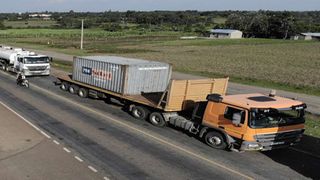
Trucks at the Malaba border on May 27, 2020 heading to Uganda.
| File | Nation Media GroupNews
Premium
Time ripe for a law on killer trailers
As friends and family of Allan Ngugi, who died in an accident on the Southern Bypass in Nairobi two weeks ago come to terms with his death, debate is raging on whether or not it is time for the government to make it mandatory for trailers to have underride bars.
Also known as impact guards, underride protection systems or Mansfield bars, are steel poles that are fixed below the platform bed of a heavy commercial vehicle from the back. They are designed to prevent smaller vehicles from sliding underneath a trailer in the case of a rear or side collision.
This is because unlike a car, heavy commercial vehicles do not have rear bumpers and their first point of contact from the back are their large wheels. During a collision between two cars, both of their bumpers help to absorb the impact.
This absorption of impact, which is very critical and could be the difference between life and death of the occupants in the vehicles, happens because bumpers minimise the height difference between cars in an accident.
However, most lorry trailers are 48 inches above the ground, while cars are mostly between 16 and 20 inches off the ground. If a car crashes into the rear of a heavy commercial vehicle, the entire length of the car would most likely crash underneath the trailer bed due to the huge height mismatch between the two vehicles.
Mr Ngugi, a programme manager at Trade Mark East Africa (TMEA), was rushing to beat the 10pm curfew when his red BMW X5 SUV rammed into a lorry ferrying goods. Because of the height difference between the two vehicles, Mr Ngugi’s BMW slid beneath the lorry, got trapped and was dragged for some metres. He died instantly.
“The lorry driver did not realise the crash has happened. He only noticed the lorry had fast lost pace, but because he was carrying goods, all seemed normal and he kept accelerating,” Lang’ata OCPD Benjamin Mwanthi told the Nation.
A postmortem indicated that the father of two died from excessive bleeding and fractures to vital bones like the ribs. In a requiem mass held at Ridgeways Baptist Church off Kiambu Road, Mr Ngugi’s friends eulogised him as a cheerful, resourceful and compassionate man who lived a happy life.
“These last couple of days I have been angry, hysterically crying and felt utter loneliness trying to understand why it had to be you,” said his sister Caroline Wanjiku.
But even as Mr Ngugi’s family comes to terms with his death, questions are being raised on whether the 39-year-old would have been alive today if the lorry that he hit from behind had some sort of barrier that would have prevented his car from sliding underneath it.
There have been similar accidents on Kenya’s roads and they mostly happen at night. Due to their weights, heavy commercial vehicles are usually slower when on the road. They are also more likely to break down, and unlike cars, they cannot be pushed to the side of the road.
When you add the fact that most of Kenya’s roads are poorly lit or unmarked, any heavy commercial vehicle that stalls on the road is a disaster waiting to happen.
Two famous benga musicians met their deaths the way Mr Ngugi met his.
In May last year Jimmy Wayuni Githinji was rushing to drop his musician friend Kibandi Jacksam when his vehicle rammed into the side of a lorry at the Kahawa Barracks exit of Thika Superhighway.
The two artistes lost consciousness after the impact and were rushed to St Joseph’s Hospital, where Mr Jacksam survived. Mr Wayuni, a retired Kenya Revenue Authority (KRA) deputy commissioner, lost his life.
A year before Wayuni’s death, John Ng'ang'a alias John De Mathew was rushing home from a fundraiser when his black Nissan Navara rammed into a lorry that was laboring uphill at Blue Post Hotel on the Thika highway.
De Mathew’s vehicle, just like Mr Ngugi’s two weeks ago, slid under the lorry and was dragged for some metres. The musician, who was in his prime, was declared dead on arrival at the hospital.
There are many Kenyans who have met their deaths on the road in the same manner. A simple solution, according to motorists, and from conversations on the internet, is to force heavy commercial vehicles to install underride bars.
“This is what we should advocate. There is no reason Kenya does not have such a law when other countries do,” said Mr Peter Murima, the chairperson of the Motorists Association of Kenya.
“We don't really need the underride guards, we just need to follow rules and regulations,” said Mr Ray Kombo, a motorist contributing to the conversation on Twitter.
The National Transport and Safety Authority (NTSA) promised to get back to us when we asked them whether they think it is necessary to have such regulation in place. Several countries, especially in the developed world, have made it mandatory for vehicles with a specific height clearance to have underride guards.
The United States National Highway Traffic Safety Administration was the first to introduce laws requiring trailers to have underride guards in 1967, after actress Jayne Mansfield, and two other passengers died when their car hit the rear of a trailer.
Ms Manfield’s death is the reason the underride bars are called Mansfield bars in the US. Today, all trailers built for use in the American and European markets must have Mansfield bars.





